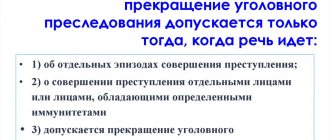Lawyer Spiridonov M.V.
12/12/2015 0 Comments Criminal cases
active repentance, theft from a store, charges of theft, termination of a criminal case, Art. 158 Criminal Code of the Russian Federation, Art. 28 Code of Criminal Procedure of the Russian Federation, Art. 75 uk rf
Recently, the number of crimes of minor and medium gravity has increased. Persons brought to criminal liability in these categories of cases have the right to terminate the criminal case on two main grounds:
1) Termination of a criminal case due to reconciliation of the parties;
2) Termination of the criminal case due to active repentance;
(note - at the moment, it is possible to terminate a criminal case for crimes of minor and medium gravity by imposing a criminal law measure in the form of a court fine).
I talked about the legal aspects and legal advice regarding the termination of a criminal case in connection with the reconciliation of the parties in my article at the link here, and also described a specific case on the website of the professional community of lawyers and advocates Pravorub.ru at the link here, which was terminated due to with reconciliation of the parties without admitting guilt.
The law contains the following conditions for termination of a criminal case on the specified basis.
According to Part 1 of Art. 75 of the Criminal Code of the Russian Federation, a person who has committed a crime of minor or moderate gravity for the first time may be released from criminal liability if, after committing the crime, he voluntarily confessed, contributed to the disclosure and investigation of the crime, compensated for the damage caused or otherwise made amends for the harm caused as a result of the crime, and, as a result of active repentance, ceased to be socially dangerous.
Paragraph 4 of the Resolution of the Plenum of the Supreme Court of the Russian Federation dated June 27, 2013 No. 19 “On the application by courts of legislation regulating the grounds and procedure for exemption from criminal liability” determines that, within the meaning of Part 1 of Article 75 of the Criminal Code of the Russian Federation, exemption from criminal liability in connection with active repentance is possible with provided that all the actions listed in it are performed or those of them that, taking into account specific circumstances, the person had an objective opportunity to perform:
(for example, detention at the scene of a crime objectively excludes the possibility of reporting to law enforcement agencies about a crime committed, however, the person’s subsequent assistance in solving and investigating the crime, compensation for damage and (or) making amends for harm in other ways may indicate his active repentance).
Courts should keep in mind that active repentance can lead to release from criminal liability only if the person as a result has ceased to be socially dangerous. When resolving the issue of a person’s loss of public danger, it is necessary to take into account the entire set of circumstances characterizing the person’s behavior after committing a crime, as well as data about his personality. At the same time, a person’s admission of his guilt without performing the actions provided for by this norm does not constitute active repentance.
Active repentance and its criminal legal significance
The article under consideration is devoted to the theoretical norms for determining the criteria for the truth of the repentance of the perpetrator when a law enforcement officer makes the right decision at the stage of criminal proceedings. This article highlights hypotheses and criteria and identifies general issues in this area. Correct understanding and identification of the designated criteria will allow the law enforcement officer to adequately assess the identity of the criminal and make a decision at the stage of criminal proceedings.
Key words: active repentance, criminal liability, criminal legislation, mitigating circumstance, criminal release.
Over the years, domestic and foreign experience of criminal justice has constantly convinced us that measures of toughening punishment alone will not reduce the number of crimes committed and will not ensure their detection. Scientific novelty from the perspective of criminal legal stimulation consists in the positive post-criminal behavior of a person in the current criminal legislation. The following trends in the development of criminal legislation on active repentance in the Soviet period should be noted: at the very beginning of the formation of the Soviet state and law, there was no unified criminal law, and criminal legal relations were regulated by decrees, orders and other regulations of the Soviet authorities. This was the case with the rules on active repentance, which appeared in some legal documents depending on the needs.
If we consider the historical aspect, then active repentance was important during the war and the first post-war years, the role of the military-political and economic instrument, the need for its legislative empowerment and implementation was determined by the heights of political power, but not by the interests of members of society who suffered as a result of the crime. The specific focus of the norms under consideration: special attention was paid to the norms of active repentance implemented in relation to persons who have committed crimes related to evasion of desertion and bribery. The development of norms of active repentance as a basis for exemption from responsibility or forgiveness of guilt was aimed at the rehabilitation and restoration of the rights of certain categories of Soviet citizens (in the post-war years (1946–1952)). It was during this historical period that the expression “exemption from responsibility” began to appear more often, rather than “exemption from punishment,” as before, which marked the beginning of the formation of an independent criminal law institution of exemption from liability in general and served as an impetus for the development of active repentance as a prerequisite for liberation from criminal liability, in particular. Throughout the entire Soviet period until 1958, there was no general rule on active repentance as a circumstance mitigating punishment. Since the legislative consolidation of active repentance as a circumstance mitigating punishment, it has been implemented by the legislator taking into account two aspects: firstly, it is considered as a criminal legal category, and secondly, a moral and psychological sign is established - the sincerity of repentance. Active repentance as a circumstance mitigating responsibility received the opportunity for further development as an independent institution, since its substantive part was specified, and prerequisites were spelled out at the legislative level, the occurrence of which must be mandatory when it is taken into account as a given circumstance. A general rule containing a provision for active repentance did not appear in the criminal law of the Soviet period. However, starting from November 1917, the practice of legislatively establishing special grounds for exemption from criminal liability in connection with active repentance for various types of crimes was successfully applied. At the same time, the number of articles containing mention of active repentance was actively growing.
Active opposition in the post-Soviet criminal legislation of Russia (January 1, 1991 - present), systemic disintegration in the socio-economic, socio-cultural, political and legal spheres, which led to the collapse of the USSR, caused the suspension of the functioning of legal institutions, which in turn required the development of new legislation and new policies in the newly formed state, including criminal law. This led to the start of intensive work on the draft Criminal Code of the Russian Federation, which was supposed to take into account the provisions and principles of the Constitution of the Russian Federation, adopted in December 1993. On October 19, 1992, the President of Russia submitted the first draft of the Criminal Code of the Russian Federation to the Supreme Council of the Russian Federation. The institution of active repentance was widely established in it. Thus, Article 57 of the draft contained a list of mitigating circumstances in the form of “admission of guilt, sincere repentance, active assistance in solving the crime,” and there was no basis for active repentance in the form of “preventing the harmful consequences of the crime committed by the defendant.” In addition, for the first time in the history of Russian criminal law, the wording of the title of the article appeared, giving active repentance as a basis for exemption from criminal liability an independent meaning, and then adopted as a basis in the current Criminal Code of the Russian Federation (Article 70 of the Project - “Exemption from criminal liability in connection with active facial remorse"). Part 1 of this article provided that a person may be released from criminal liability if the act was committed for the first time, the crime does not pose a great public danger (criminal offense) or is less serious, and after the commission of the crime the person admitted to the crime and compensated for the damage caused. The second part of Article 70, in contrast to the first part, provided, in addition to a general exemption from criminal liability in connection with active repentance, a special condition set out in the notes to the articles of the special part. However, despite the presentation of such a project by the President, active work was underway on alternative versions of the Criminal Code. Thus, in October 1994, two projects were submitted to the State Duma of the Russian Federation: presidential and parliamentary. The first of them was developed on the basis of the 1992 project, the second - on the basis of alternative projects. This necessitated the coordination of the submitted proposals in order to obtain a single project that meets the interests of both parties. The result of this work was: Firstly, the creation of a unified Criminal Code of the Russian Federation, consisting of two parts: general and special. Secondly, the following were established as grounds for active repentance as circumstances mitigating punishment: “turning oneself in, actively contributing to solving a crime, exposing other participants in the crime and searching for property acquired as a result of the crime; providing medical and other assistance to the victim immediately after the crime; voluntary compensation or elimination of material and moral harm caused by the crime, other actions aimed at making amends for the harm caused to the victim.” From this it is clear that the legislator has detailed the assistance in solving a crime by listing its forms (exposing accomplices, searching for property obtained by criminal means), and has also separated the reparation of harm into an independent element. Compared to the 1992 Draft, the content of the article in the General Part “Exemption from criminal liability in connection with active repentance” has changed significantly. The number of articles in the Special Part has increased, containing notes with a special type of exemption from criminal liability on the basis of active repentance. After lengthy discussion and agreement, on June 13, 1996, the Criminal Code of the Russian Federation was adopted. His Art. 61 contained a list of circumstances mitigating punishment, among which active repentance may include such as surrender, active assistance in solving the crime, exposing other participants in the crime and searching for property obtained as a result of the crime (clause “and”); provision of medical and other assistance to the victim immediately after the crime, voluntary compensation for property damage and moral harm caused by the crime, other actions aimed at making amends for the harm caused to the victim (item “k”) Compared to the 1992 Project, this list was included a number of changes: contributed not only to the detection of the crime, but also to its investigation, as well as contributed not only to the exposure of other accomplices, but also to their criminal prosecution (clause “and” of Part 1 of Article 61 of the Criminal Code of the Russian Federation). In Article 75 of the Criminal Code of the Russian Federation, active repentance was established as an independent basis for exemption from criminal liability. In Part 1 of Art. 75 of the Criminal Code of the Russian Federation formulates the grounds for exemption from criminal liability in connection with active repentance: the crime was committed for the first time, the category of the crime is of minor gravity. Carrying out a number of actions after the commission of a crime: confession, facilitating the detection of a crime, compensation for damage caused or otherwise making amends for harm, Part 2 of Art. 75 of the Criminal Code of the Russian Federation extended the effect of the institution of active repentance beyond its General Part, establishing the possibility of exemption from criminal liability for crimes of another category “subject to the conditions provided for in Part 1 of this article, and only in cases specifically provided for by the relevant articles of the Special Part of this Code " From the moment the Criminal Code of the Russian Federation came into force and to the present time, the wording of clause “and” of Art. 61 and art. 75 underwent changes and additions. Federal Law No. 162-FZ of December 8, 2003 expanded the scope of Part 1 of Article 75 to crimes of average gravity, and also established a new basis for active repentance. Later, by Federal Law No. 141-FZ of June 29, 2009, such a basis for active repentance, provided for in Part 1 of Art. 75 of the Criminal Code of the Russian Federation as “facilitating the detection of a crime” was replaced by “facilitating the disclosure and investigation of a crime.” Until now, the number and content of the grounds for active repentance provided for in Part 1 of Art. 75 of the Criminal Code of the Russian Federation, were no longer changed. Only stylistic and linguistic amendments were made in the form of changing the wording of such a basis for active repentance as “compensation for damage and making amends for harm.” In the current version, Part 1 of Art. 75 of the Criminal Code of the Russian Federation, the specified basis is stated as follows: “compensated for the damage or otherwise made amends for the harm caused by this crime.” The changes affected only Part 2 of Art. 75 of the Criminal Code of the Russian Federation once. Federal Law No. 53-FZ of July 27, 2006 removed from it the wording “subject to the conditions provided for in Part 1 of this article” (which, in our opinion, expanded the scope of this article), and also the dispositive norm was replaced by a mandatory one, so how the legislator provided for the mandatory nature of exemption from criminal liability in accordance with Part 2 of Art. 75 of the Criminal Code of the Russian Federation, replacing the phrase “may be released” with “released”. Having analyzed the content of the notes on exemption from criminal liability to the articles of the Special Part of the Criminal Code of the Russian Federation, we came to the conclusion that currently more than 30 of them contain a special basis for exemption from criminal liability in connection with active repentance. It is important to note that a large number of compositions with similar notes have been introduced by the legislator over the past few years. This Criminal Code enshrines a norm (Article 75) providing for exemption from criminal liability in connection with active repentance. A person who has committed a minor crime for the first time may be released from criminal liability if, after committing the crime: 1) voluntarily confessed, 2) contributed to the detection of the crime, 3) made amends for the harm caused as a result of the crime.
Some crimes provide for mitigation of liability and exemption from it for persons who confess, compensate for the damage caused, contribute to the identification and exposure of other participants in the crime, and the search for property obtained by criminal means. In this case, active repentance refers to one of the types of positive behavior encouraged by the law of the person who committed the crime. It follows from this that one of the conditions for the effective application of new norms for our criminal law is the study of the personal behavior of persons who have committed a crime. The person's conduct in question may be either criminal or lawful, both before and after it was committed.
At the same time, the meaning of active repentance and its essence, the reasons for its occurrence and mechanisms, the features of the methodology for proving and assessing a legally significant circumstance in criminal cases have not been fully studied and are not covered in sufficient detail in the professional literature.
Without scientifically based recommendations, investigators and prosecutors in most cases experience difficulties in proving and legal assessment of active repentance, make tactical mistakes in identifying the psychological and moral motives of active repentance, and operational officers and investigators periodically violate the law in connection with the use of prohibited means and ways to obtain “sincere confession”.
Active repentance includes mitigating circumstances provided for in Art. 61 of the Criminal Code of the Russian Federation, each of which, in accordance with Art. 68 of the Criminal Code of the RSFSR, is subject to mandatory proof.
However, a study of practice has shown that during the pre-trial investigation and in court, due attention is not always paid to establishing these circumstances. In criminal cases, evidence is collected primarily for the prosecution, and evidence exonerating the accused, mitigating his responsibility and indicating his active repentance is ignored.
As a rule, in criminal cases there was not enough information about the manifestation of repentance by suspects and accused. The materials of the indictment do not contain an analysis of factual data about their active repentance, and no legal assessment of this circumstance is given. Such trends, errors, and misconceptions are largely due to weak scientific and methodological support for investigative and judicial practice.
A very important place among the circumstances mitigating punishment is given to the repentance of the person who committed the crime. The option of active repentance, which involves certain physical efforts to actively contribute to compensation for the damage caused, is directly enshrined in the criminal law as a circumstance mitigating punishment (clause “i, k”, part 1 of article 61 of the Criminal Code of the Russian Federation), as well as one of the grounds for release from criminal liability (Article 75 of the Criminal Code of the Russian Federation). An important element of the structure of a pre-trial cooperation agreement is also active repentance, which implies the active efforts of the perpetrator aimed at solving and prosecuting the crime, compensation for damage, and bringing the perpetrators to justice. With its help, principles such as humanism, justice, and individualization in criminal law are implemented.
In addition to active repentance, the court in practice takes into account as a mitigating circumstance and repentance the act of self-condemnation, when a person, realizing the illegality of his own behavior, openly declares this during the trial. The presence of such repentance is taken into account under Part 2 of Art. 61 of the Criminal Code of the Russian Federation as “other,” i.e., a mitigating circumstance not provided for by law.
Taking into account remorse as a mitigating circumstance often leads to a reduced sentence, a suspended sentence, or release from punishment.
Such legally significant consequences impose on the court the need to carefully analyze arguments regarding the veracity of repentance, both active and an act of self-incrimination. To assess the authenticity of repentance, the criteria by which conclusions can be drawn are, of course, important.
Consequently, it seems important to distinguish between its internal and external components in the structure of repentance. At the same time, the internal component, in my opinion, should be understood as a real state of condemnation of one’s own misconduct, awareness of unlawful, past unlawful behavior, and the external component should be understood as a statement of self-incrimination expressed to the victim, the preliminary investigation authorities and the court.
A mere outward statement of remorse, devoid of substance, has absolutely no bearing on a fair trial. This is dictated only by a person’s desire to mitigate responsibility or avoid it altogether. At the same time, it is of no value to society and the state, since false repentance does not contribute to achieving the goals set by the criminal law. In judicial practice, there are often cases when persons leading a criminal lifestyle, when brought to justice, express “sincere repentance”, admit their guilt and openly declare their intention not to repeat such actions in the future. In these circumstances, the inclusion of remorse as a mitigating circumstance is unlikely, since it is only external remorse and has no significant internal basis.
As a rule, the presence of external remorse is not in doubt. An oral or written statement by a person expressing remorse, recorded in testimony, in the record of investigative actions or in a court hearing, is obvious and does not require separate discussion. Inner repentance, which truly reflects the state of a person who has realized the wrongfulness of his own behavior, is a completely different matter.
In this regard, a difficult question arises about the criteria by which the court could draw conclusions about the authenticity of repentance, about the presence of an important internal side of self-justification, leading to the goal of correcting a person and preventing repeated criminal behavior.
Assessing a person's inner beliefs seems to be a very complex process. Unfortunately, lies, which are so written into human nature, are often veiled, covered with many external attributes, and are quite difficult to detect. According to T. B. Gusev, “justifying lies” is often aimed at “whitewashing in order to mitigate punishment.” However, these difficulties should not discourage the researcher from the question posed, since identifying the veracity of repentance, as noted above, is very important. Let's consider this issue and possible ways to solve it.
Let us present as a hypothesis the circumstances by which, in my opinion, the truth of a person’s repentance should be assessed.
Firstly, it is necessary to pay attention to the absence of relapses, especially the so-called special relapses, when a person commits the same socially dangerous acts, that is, leads a criminal lifestyle. Here it is important to pay attention to previous court sentences. If someone repeatedly commits such crimes, and when the decision is made to bring him to justice, he “sincerely” repents, then only his desire to mitigate his responsibility is obvious.
Secondly, true repentance is always preceded by an admission of guilt and a desire to help solve a crime and investigate a criminal case, give truthful testimony, and reveal the true motivation for criminal behavior. Rather, repeated changes of testimony or passive behavior by a person indicate forced repentance expressed only to prevent the possibility of aggravated punishment.
Thirdly, sincere confession is very important. True and sincere repentance can hardly be called such self-incrimination, which is expressed under the influence of external factors, which may include, in particular, the testimony of other accomplices, the presentation of evidence incriminating the perpetrator, and a more severe punishment.
Fourthly, this apology to the injured party, the desire to change the situation for the better, and the correction of mistakes made, also indicate sincere recognition and repentance.
Based on the foregoing, it can be argued that the true repentance of a person who has committed a crime should be considered one that is based on a full admission of guilt, made voluntarily without external coercion and consisting of a combination of internal sincere regret for the committed act and an external statement about it, accompanied by a desire to correct mistakes made and help government authorities resolve the criminal case as quickly and objectively as possible.
Summarizing all of the above, I can draw the following conclusions. For the first time in the history of the entire criminal legislation of Russia, the term “active repentance” was enshrined in the Criminal Code of the Russian Federation in 1996, and its institution acquired the status of independent and legal significance as a comprehensive one, taking into account many years of historical experience in its development, as well as taking into account the generally recognized principles and norms of international law . The forms of public participation in the implementation of criminal policy, typical for the Soviet state, have disappeared - release from criminal liability with the transfer of the case to a comrades' court or with the transfer of a person on bail. Compared to the legislation of previous years, the Criminal Code of the Russian Federation of 1996 increased and specified the list of grounds that constitute active repentance, the presence of which determines the possibility of its application, and also increased the number of articles containing special rules on active repentance.
Literature:
- Artamonov A. N. Termination of a criminal case (criminal prosecution) due to the absence of a crime, the absence of corpus delicti in the act, the non-involvement of the suspect or accused in committing the crime // Legislation and practice. 2015. N 1.
- Blagov E.V. Exemption from criminal liability (reflections on problems and their overcoming) / E.V. Blagov. Moscow: Yurlitinform, 2021.
- Vandyshev V.V. Criminal process. General and Special parts: Textbook for law schools and faculties. M.: WoltersKluwer, 2010.
- The relationship between criminal and criminal procedural law / Under the general editorship of M. B. Kostrova. Moscow: Prospekt, 2014.
- Voskobitova L. A. Initiation and termination of a criminal case, analysis of investigative practice // Criminal proceedings. 2010. N 2.
- Conclusion of the PU Office of the State Duma of the Federal Assembly of the Russian Federation dated February 16, 2016 N 2.2–1/710 “On the draft Federal Law N 953369–6 “On amendments to the Criminal Code of the Russian Federation and the Criminal Procedure Code of the Russian Federation on improving the grounds and procedure for release from criminal charges” responsibility" (first reading) // ATP "ConsultantPlus".
- Luneev V.V. Crime of the 20th century. World, regional and Russian trends. M.: Norma, 1997.
- Makeeva I.V. Termination of criminal cases according to the criminal procedural legislation of the Russian Federation and Ukraine // International criminal law and international justice. 2013. N 6.
- Resolution of the Plenum of the Supreme Court of the Russian Federation dated June 27, 2013 N 19 “On the application by courts of legislation regulating the grounds and procedure for exemption from criminal liability” // Bulletin of the Supreme Court of the Russian Federation. 2013. N 8.
- Explanatory note “To the draft Federal Law “On Amendments to the Criminal Code of the Russian Federation and the Criminal Procedure Code of the Russian Federation on improving the grounds and procedure for exemption from criminal liability” // https://asozd.duma.gov.ru.
- Ryzhakov A.P. Termination of a criminal case: a new basis // ATP “ConsultantPlus”, 2021.
- “Criminal Procedure Code of the Russian Federation” dated December 18, 2001 N 174-FZ (as amended on July 1, 2021).
What is active repentance?
In Criminal Law there is such a thing as active repentance. This is an awareness of one's guilt, which is expressed in actions.
For example, smoothing out a conflict in the form of compensation for harm or another way to reduce the consequences resulting from a crime.
Active repentance means that admitting to committing a crime and making amends for one’s own guilt through positive actions makes it possible to reduce the sentence, and sometimes even avoid criminal liability.
You can show active repentance by the following actions:
- Confession . This means that a person who has committed illegal actions of his own free will contacts an authority that has the right to initiate a criminal case and writes a statement about the crime committed; in most cases, the authorities are not yet aware of this. The application is documented in a protocol of voluntary appearance. This document is signed by the applicant and the official of the relevant law enforcement agency.
- Contributing to solving a crime . Such actions may consist of issuing instruments and means of committing a crime, indicating the location of the crime or the place where stolen property was hidden, and identifying other participants in the crime.
- Compensation for damage caused at one's own free will , compensation for property damage in monetary or other terms that will be sufficient to compensate for the losses of the victim as a result of the crime.
- Making amends for harm caused as a result of a crime in another way. Eliminating the destruction caused by one’s own work, apologizing for insults caused, refuting false information that hurts the honor and dignity of another person or spoils his reputation.
Only the presence of a combination of the above conditions can contribute to the termination of a criminal case due to active repentance.
This type of exemption from liability is optional and is not an obligation, but a right of the law enforcer.
A decision can be made if the investigator concludes that it is inappropriate to prosecute a person who, after committing a crime, has confirmed his repentance and has ceased to pose a danger to society.
To terminate a criminal case with active repentance, the following conditions must be met:
- Lack of objection by the suspect or accused.
- Making a decision to terminate a criminal case by an authorized person within the competence established by the Code of Criminal Procedure.
- Compliance with procedural form.
- If the decision to terminate a criminal case is made by an investigator, the consent of the prosecutor is required.
Active repentance is a non-rehabilitating basis for suspending the criminal prosecution of a suspect.
For example, if a taxpayer is exempt from criminal liability on a non-rehabilitating basis, then tax liability on a non-rehabilitating basis is not relieved from him if the actions he committed simultaneously contain signs of a tax offense.
It is quite difficult to understand such complex legal institutions as termination of criminal liability and prosecution by law enforcement agencies.
general information
The investigation of any crime is not a simple matter and requires a significant investment of time, effort and resources from law enforcement agencies at all levels, especially when it comes to an accidental attacker who has stumbled for the first time and crossed the border of legality. It is especially difficult to identify such a subject, since he does not belong to the criminal elements known to the police, is not listed in the database and file cabinets, which means it will be difficult to find him. Largely due to similar considerations, legislators in many countries, including Russia, have introduced into the criminal codes the possibility of avoiding punishment by voluntarily admitting to the crime, repenting and helping to uncover the illegal act.
A criminal who comes to the police station for a sincere confession saves criminal investigation and inquiry officers from carrying out numerous activities that can take months or even years. In addition to freeing law enforcement officers from work, a repentant criminal, who has realized the inadmissibility of causing harm to others, relieves society from the need to correct his behavior, which means it relieves the burden on the penitentiary system and saves taxpayers’ money.
We will talk about what the termination of the case due to active repentance requires below.
The following video will tell you what the Criminal Code of the Russian Federation says about active repentance:
Concept
In criminal law, in the articles of the Criminal Code of the Russian Federation, active repentance is understood as the performance by the stumbled subject of a set of actions demonstrating his changed attitude towards what happened and regret about the damage caused, namely:
- appearing before any law enforcement agency with a confession of the crime committed;
- active assistance to the police and prosecutor's office during the investigation, indicating details, motive, accomplices and providing evidence confirming the truthfulness;
- compensation measures aimed at monetary or other compensation for damage caused, sufficient to satisfy the claims of the victim.
In addition to the desire to avoid punishment and the implementation of the actions provided for this by law, formal characteristics must be observed that allow for this possibility, including:
- mild or moderate severity of damage and consequences from the actions committed;
- implementation of an illegal act for the first time.
The possibility of admitting one’s guilt and comprehensive actions to level it are provided for in Article 75 of the Criminal Code of the Russian Federation and Article 28 of the Code of Criminal Procedure of the Russian Federation, which do not exclude forgiveness for more serious offenses, if this is provided for in the Special Part of the Criminal Code.
Legal meaning
The subjectivity of active repentance lies in the correction of a person as a result of internal changes resulting from causing harm to another and awareness of the consequences of one’s actions. However, in practice one often has to deal with the objective nature of repentance, which consists in the rational use of the opportunity to legally evade punishment.
It is left to the judge to determine the fine line between the two forms of repentance of an individual who has violated the letter of the law, who, based on life experience and personal impressions, must determine the sincerity of the defendant’s behavior.
Often, the true motives of a criminal cooperating with the investigation do not matter to the justice authority, since the testimony of one criminal element who has committed a minor crime makes it possible to prevent or solve cases with much more serious consequences.
Among criminals, there is even a separate caste of informants who actively cooperate with law enforcement agencies, helping to search for bandits and uncover illegal acts, in exchange for forgiveness of their own offenses and freedom. Now let's talk about voluntary renunciation of crime and active repentance.
Signs and differences from voluntary refusal
Repentance can only accompany committed offenses against other members of society or society itself, since conscience manifests itself when an undesirable event has already happened. The characteristic difference between refusal on a voluntary basis lies in the term itself and lies in the fact that the illegal action was not carried out, although all the necessary preparations were made.
Repentance is a consequence of too active and rash actions, often impulsive and not planned in advance, in contrast to refusal, which occurs due to fear or due to circumstances, after preliminary preparation and in the presence of malicious intent. The social danger from a person who has stumbled but realized that he was wrong is leveled out, in contrast to someone who simply refused to commit an atrocity, quite possibly simply postponing it for later.
We will talk about special cases of active repentance further.
Economic crimes and active repentance
Similar to active repentance, Russian criminal law provides for exemption from liability for a number of crimes in the economic sphere.
The phrase “ active repentance ” is not used directly in relation to these offenses. However, a number of conditions (the initial commission of the offense and compensation for damage) make it possible to mention active repentance regarding these episodes of violation of the law.
It is possible to avoid criminal liability for the following economic crimes:
- A first-time offense of non-payment of taxes or failure to fulfill the obligations of a tax agent, if the damage to the state is fully compensated.
- Illegal entrepreneurship without aggravating circumstances.
- Banking activities prohibited by law.
- Illegal acquisition of a targeted government loan or its misuse.
- Malicious failure to repay a loan.
- Illegal use of a trademark or other marking.
- Illegal acquisition of property by athletes, participants or organizers of competitions for the sake of changing the results of the competition.
- Violations during the issue of shares and other securities (without aggravating circumstances).
- Deliberate evasion of disclosure of information and violation of accounting of rights to securities.
- Market manipulation and obstruction of the rights of shareholders.
- Offenses in the field of bankruptcy proceedings.
- Failure to pay customs duties.
For offenses from points 2 to 12, relief from criminal liability occurs subject to a primary violation of the law, as well as compensation for damages in the amount of 5 times.






